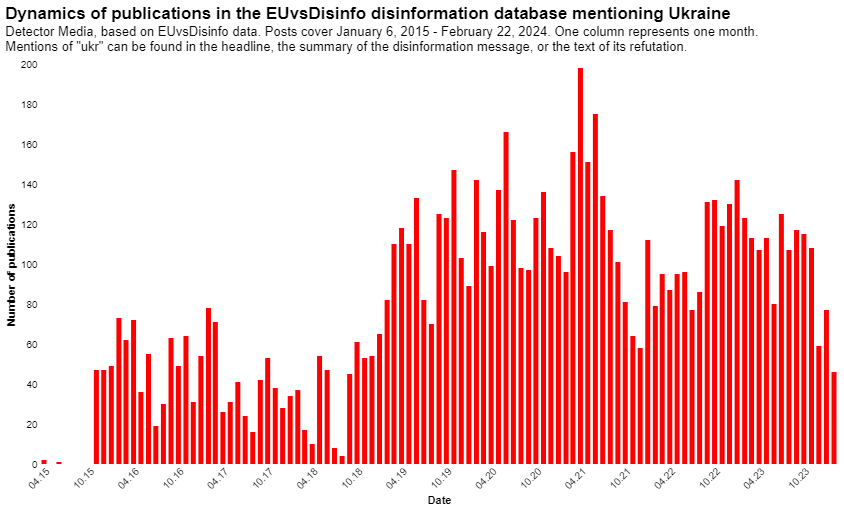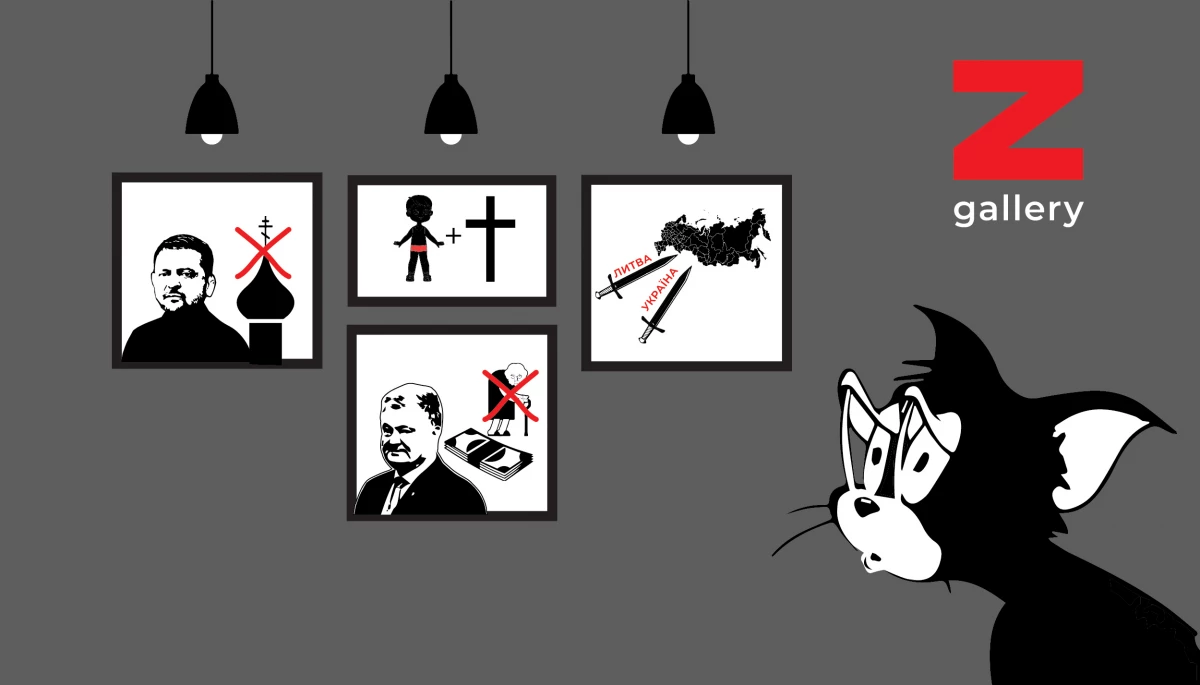Українською читайте тут.
Fakes about Ukraine are one of the most visible ones in Europe and the world. This statement can be proven using the example of the database of hoaxes, which has been maintained by the EU-funded EUvsDisinfo project since June 2015. As of February 22, 2024, this database contains 16,629 publications with refutations of fakes. Ukraine is mentioned in 8433 cases. For comparison, the USA, the main enemy of Russia, according to Russian agitational propaganda and Russians as interviewed by sociologists, is mentioned in 7,067 cases, the EU — in 6,205, and Poland — in 1,957.
However, the actual number of mentions of these countries in disinformation messages in the media and social networks is higher. After all, in the EUvsDisinfo database, fakes of the same type are often grouped into one record with links to the media that shared them.

Dynamics of publications in the EUvsDisinfo database mentioning Ukraine from January 2015 to February 2024
Regular entries mentioning Ukraine in the EUvsDisinfo database began in October 2015. Until the beginning of 2016, fact-checkers documented the following Russian propaganda messages about Ukraine: Ukrainian Nazis, "Ukraine is an artificial nation", external management of Ukraine, coup d'état in Ukraine, US-organized war against Russia in Ukraine, and resale of weapons to terrorist formations. In the future, these messages were used with adaptation to current informational reasons. For example, the hoax about "selling arms to terrorists again" was actively shared in different versions after a full-scale invasion.
From 2016 to 2022, publications about Ukraine's "resale of arms" became less visible. However, fakes about corruption in Ukraine have gained more prominence. They were supplemented by proposals to give in to Russia's demands not to worsen Ukraine's economic situation further. In 2015, after Ukraine's gross domestic product decreased and bottomed out due to a decline that began after Russia's aggression against Ukraine, the economy started to recover. The Russians also used Ukraine's economic, political, and European integration achievements in their propaganda activities. For example, in April 2017, fact-checkers recorded reports that "tens of thousands of neo-Nazis" would come to Europe due to the possibility of traveling to the EU without visas or that visa-free travel was granted to Ukraine in exchange for its natural resources. As a reminder, the visa-free travel regime for Ukrainians with biometric passports started on June 11, 2017.
2018 began with threats that the EU was depriving Ukraine of support and that "Ukraine lost half of its GDP due to sanctions imposed on Russia." In April, Ukraine was accused of poisoning former Russian spy Sergey Skripal in Britain. Later, the British investigation established that the Russians were behind the attempt.
In May 2018, disinformers claimed that visa-free travel would be taken from Ukraine, Moldova, and Georgia. In the summer, Russia reported that Ukraine was planning a large-scale offensive in eastern Ukraine. In the fall, when ammunition depots exploded in Ichna, Chernihiv Oblast, Russians spread fakes that Ukraine was hiding evidence of involvement in the downing of a civilian plane in the summer of 2014. In January 2023, the European Court of Human Rights recognized that the plane was shot down by two citizens of Russia and one citizen of Ukraine, who went over to the side of the occupiers, by the Buk anti-aircraft missile complex that was brought from Russia, and that it was Russia that controlled that part of Donetsk region from which this Buk was fired.
Publications with words containing "ukrain" in EUvsDisinfo database from 2015 to February 19, 2024
Fakes about Ukraine in 2019 were primarily based on news and information from real life. The year began with accusations of oppression of the Orthodox believers, from whom the "churches are being taken away." This was because Ecumenical Patriarch Bartholomew gave the Orthodox Church of Ukraine a tomos on autocephaly. In the spring, propagandists focused on the presidential and parliamentary election campaigns, discussed voter oppression, external interference in elections, etc. After that, they went on accusing Ukraine of inciting an armed conflict in the east of Ukraine, violating the Minsk agreements, and accusing Ukrainians of Russophobia.
Top 20 individuals and state and non-state organizations most frequently mentioned in publications about Ukraine in the EUvsDisinfo database at various times
The COVID-19 pandemic also coincided with the revival of the topic of "US biolaboratories on the territory of Ukraine." Such hoaxes had become most visible since 2020 when Russian propaganda focused on finding reasons to justify their military actions on the territory of other states due to the perceived threat of biological weapons that only affect members of certain ethnic groups. The topic of biolaboratories, like the topic of the Nazis, may have served as an indicator that Russian propaganda is turning its society against particular states. For example, mentioning Azerbaijan and Kazakhstan when discussing "US biolaboratories" was not noticeable until 2023. But it became relevant during the armed conflict between Armenia and Azerbaijan, which Russia distanced itself from, and its relations with Azerbaijan worsened, including due to a full-scale invasion of Ukraine. During these years, Kazakhstan expanded sanctions against Russia, reactivated the plan to switch from the Cyrillic alphabet to the Latin alphabet, and canceled concerts for Russian stars who supported the invasion of Ukraine. Because of this, the Russians began to call the Kazakhs "Kazakhists" [from ‘fascist’].
At the beginning of 2021, a new propaganda message appeared, saying that Ukraine, which refuses to buy the Russian vaccine against COVID-19, harms Ukrainians. At the same time, the propagandists intimidated the newly elected US President Joe Biden with fakes claiming that he would force the inhabitants of the "Ukraine colony" to fight against Russia.
The year 2022, before Russia's full-scale invasion of Ukraine, began with propaganda narratives accusing the West of preparing Ukraine for war against Russia. They were accompanied by "assurances" that Russia is not a party in the "internal conflict in Ukraine", that "Russophobia is growing in Ukraine," and that "the USA wants war" between Russia and Ukraine. After the Russian full-scale invasion, fact-checkers were forced to debunk fakes about Ukrainian Nazis and the "genocide of the people of Donbas", already refuted in 2014.
The new disinformation topic in the first weeks after Russia’s full-scale invasion of Ukraine became the reports about the Ukrainian military’s "mass surrender", the escape or death of Ukraine’s leadership, and the good old fake about American biolaboratories in Ukraine. In April 2022, Russian propaganda and pro-Russian experts switched to denying the crimes in Bucha and "assured" that Poland seized part of Ukraine.
From the second half of 2022, Russian propaganda in Ukraine and the world, in addition to repeating older fakes, makes an emphasis on the messages that Russia is fighting against a global conspiracy that aims to destroy Russia, and other justifications for aggression against Ukraine, such as accusing Ukraine's neighbors of plans to seize territories of different states, all of which is aimed at reducing support for Ukraine abroad.
Key topics of fake debunkings in the EUvsDisinfo database
Russians are trying to blur the information space with messages about the imaginary invasion of Ukraine by other neighbors. Most often, Poland is portrayed as an aggressor in these fakes. Russia also spread such hoaxes from 2015 to 2021, but more appeared from the beginning of 2022.
Disinformation messages, in addition to being tied to informational reasons, sometimes have seasonality. During the winter, reports about possible coup d'etats and epidemics in the army or among civilians appear more often. According to documents from the EUvsDisinfo database, among the 205 entries mentioning Ukraine in the headlines of propaganda messages, the word "coup" was used more often in autumn, winter, and March than in the warm season. From April to August, it was used only 69 times. This can be explained by the fact that Russians link the word "coup" to the Revolution of Dignity in Ukraine, which began in November 2013 and ended in February 2014. After that, Russia occupied Crimea. From year to year, when the anniversary of the Revolution of Dignity comes, Russians return to this word. They also justified the occupation of Crimea, hostilities in the east of Ukraine, and the invasion of Ukraine, using precisely this word/narrative.
One hundred common nouns used in publications with references to Ukraine in the title from the EUvsDisnfo database
However, seasonality in fakes is less noticeable than the linking to the newsworthy events, to which propagandists adapt messages from a set of their standard topics. The adaptability of the newsworthy events, which are disturbing society, makes repeatedly refuted messages influential once again. Another factor that makes hoaxes influential is their constant repetition by Russian media, pro-Russian experts, and Russian officials. When influential people regularly spread false information, other media representatives notice and pay attention to them. Therefore, theses about a "coup d'état in Ukraine", "Russian Crimea", or "plans to invade Russia" started to be discussed by other media, politicians, and officials.
Collage credits: Natalia Lobach



